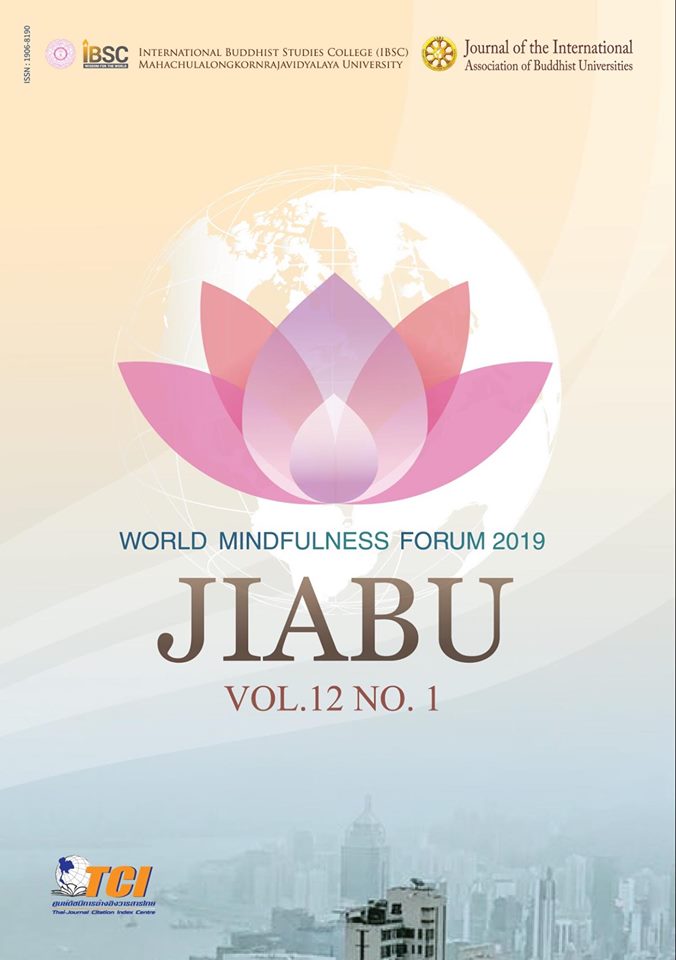The Human Personality Development: An Integration Method of Psychoanalysis and Theravāda Buddhism Perspective
Main Article Content
Abstract
The main objectives of this research paper are to discuss on the concept of human
personality development and propose an integration method of human personality development
from Psychoanalysis and Theravāda Buddhist perspectives. This is a qualitative research
methodology used primarily document, research reports. During the course of this work,
the fi ndings of the revolutionary theory of psychoanalysis and it is indeed a great idea in
human personality. Sigmund Freud’s perspective of human personality is a grand theory to
explain from the interactions among what he proposed as the three fundamental structures
of the human mind: the id, ego, superego and the consciousness, the pre-consciousness
and the unconsciousness. Meticulous research delves into the origins and course of human
personality development, the nature of mind, the abnormal aspects of personality and how
human personality development can be changed by psychotherapy.
Article Details
Views and opinions expressed in the articles published by The Journal of the International Association of Buddhist Universities (JIABU), are of responsibility by such authors but not the editors and do not necessarily reflect those of the editors.
References
Boston: Wisdom Publications.
Bodhi, Bhikkhu (tr.) (2007). A Comprehensive Manual of Abhidhamma (Abhidhamma Saṇ gaha.
Sri Lanka: Buddhist Publication Society.
Bodhi, Bhikkhu and Ñā ṇ moli, Bhikkhu (tr.) (1995). The Middle Length Discourses of the
Buddha (Majjhima Nikā ya). Kandy: Buddhist Publication Society.
Colman, A. M. (2001). A Dictionary of Psychology. New York: Oxford University Press.
Dhammanada, K. S. (1988). The Dhammapada. Kuala Lumpur: Buddhist Missionary Society.
Fausboll, V. (ed.) (1963). Jā taka. Vol.v. Luzac & Company Ltd.
Hilgard, E. R. (1953). Buddhism and Psychology, Introduction to Psychology. New York:
Oxford and IBH Publishing Company.
Maurice, W. (ed.) (2012). The Long Discourses of the Buddha. Boston: Wisdom Publications.
Muller, F. M. (tr.) (1898). Dhammapada. Oxford: Clarendon Press.
Nissanka, H.S.S. (2002). Buddhist Psychotherapy. Sri Lanka: Buddhist Cultural Centre.
Nyanatiloka (2000). Buddhist Dictionary: Manuals of Buddhist Terms and Doctrines. Taipei:
The Corporate Body of the Buddha Educational Foundation.
Olson, C. (2009). A to Z of Buddhism: The A to Z Guide Series, No. 124.UK: The Scarecrow
Press.
Payutto, P. A. Freedom Individual and Social. Thailand: Published by Buddhadhamma
Foundation Publications.
Rahula (2000). What the Buddha Taught. Bangkok: Haw Rai.
Rhys Davids, C.A.F. and Stede, W. (1953). The Pāli Text Society’s Pāli-English Dictionary.
London: PTS.
Silva, P. D. (ed.) (2005). An Introduction to Buddhist Psychology. New York: Palgrave
Macmillan.
Timothy, T. (2005). A Brief History of Psychotherapy, The Selected Works of Timothy Thomson.
San Francisco: Northern Arizona University.
Weiten, W. and Lloyd, M. A. (ed.) (2006). Psychology Applied to Modern Life: Adjustment
in the 21st Century. USA: Thomson Learning, Inc.
Zimbardo, P. G. (ed.) (1985). Psychology and Life. USA: Library of Congress Cataloging
in Publication Data.


